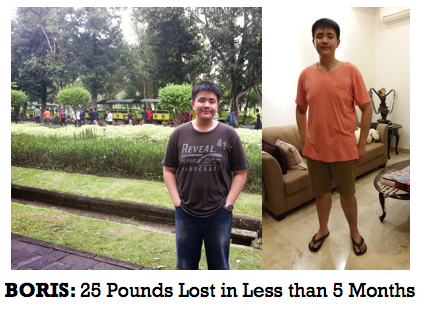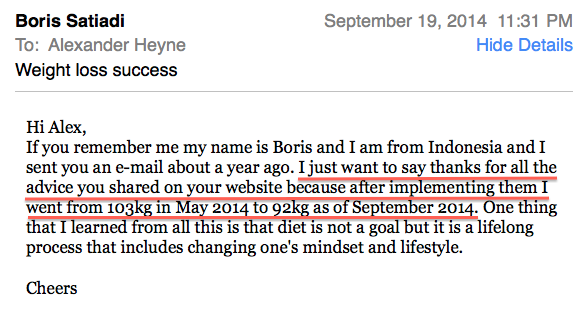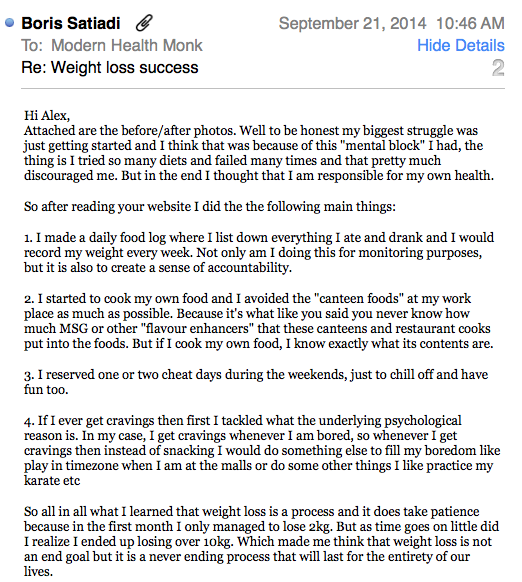
Case Study: How Boris Lost 25 Pounds, Beat His Cravings, and Got His Life Back
Note: I am opening limited enrollment for Dream Body: the Anti-Diet solution program later this month, if you’d like to join the waitlist, you can do so here.
Today I want to share with you a case study of a Modern Health Monk student that recently sent over a fantastic email detailing how he lost 25 pounds using the advice here.
(June update: Using the principles here, Boris has since lost 46 pounds).
A few things to pay attention to:
He talks a lot about being patient – it would be great if we could lose 25 pounds in a month. Most of us can’t. He didn’t – he lost on a very realistic timeline: it took him 4-5 months to lose 25 pounds. That’s a perfect, realistic timeline. I’ve had many people tell me that they were “disappointed” that they lost 5 pounds in a week.
Ridiculous! This is what happens when marketing and a bunch of BS has invaded the health industry – we don’t even know what’s realistic anymore. We don’t know what’s real.
Well, this is REAL.
So, here’s Boris’ story.
Enter Boris: A Modern Health Monk Case Study
I received an email several months back from Indonesia:

Naturally. I was a bit curious.
I sent an email back saying, “YES! Boris you are amazing. Tell me more.”
I wanted to know specifically what he applied to get to where he was, and here’s what he shared:

Side note, here’s Boris before and after:

Let’s Get Specific: What Did He Do?
I want to quickly bring up a few things that I don’t see a lot of people doing or paying attention to, particularly the mental aspects of the game here.
1. Mental block, the narrative. “Because I had failed so many times before.”
I LOVE that Boris brought this up.
In my book coming out this month, based on the extensive interviews I did with the people that lost 100+ pounds with habit changes, I profiled two main strategies they employed to be successful.
The first – overcoming what I call is the “narrative.” The narrative is that annoying voice in our head. It’s the voice that says, “I’ve failed before, so why bother even trying again?” or “I always fail, so I’m just going to enjoy my life and eat what I want.” Sometimes it’s just the voice that says, “I deserve this, it’s been a long day” and then tries to sabotage us. It’s the same voice that tells us we don’t deserve something we really want in life.
Overwhelmingly, the narrative is just a lie. It’s often based on the truth (e.g. we failed once or twice before to achieve a certain goal), but then the mind takes over and goes crazy. It goes haywire.
I love that he brought this up as the first thing – because just like I’ve observed personally, this is often the biggest reason why we fail in the long run to reach our goals. The narrative starts getting loud, discourages us, and makes us want to quit.
But Boris realized the truth: that if he didn’t change, no one was going to help him eat right or change his life. In fact, it’s always up to us. But until we decide that we’ve had enough, nothing ever changes.
So, #1 he tackled “The Narrative” aspect of his health – that negative inner voice.
2. “I recorded everything.” Just accountability.
There’s an old saying that “what’s get measured, gets managed.”
It’s funny, tracking food (not calories) flat out works.
And it works for one reason and one reason only: we start paying attention, objectively, to what we’re putting inside our body. There are no surprises once we start writing it all down.
It also brings a certain amount of presence and lightning awareness to what we’re doing on a daily basis: is this really going to get me closer to where I want to be? In fact, there probably isn’t a single better way to bring more conscious attention to what we eat throughout the day than simply writing down what we eat. It’s not fun – and I don’t recommend calorie counting – but it produces awareness like few things can.
3. Cooking his own food.
One of the tough things I talk about is cooking. Nutrition is the toughest part about health, weight loss, and life because we make dozens of nutritional decisions every day. When we’re stressed, those principles can go out the window. When it’s a rough day, we don’t care. When we don’ sleep enough, we literally, physiologically crave foods.
And one of the sad truths is that even eating healthy food when you eat out, sometimes isn’t healthy food! Just see this experiment I did here.
Ultimately the only way to control what we eat is to make it ourselves – and he specifically referenced avoiding the work canteen which likely had MSG, food preservatives, or low quality food in general.
A general idea I suggest is this: commit to one simple routine for cooking your own food. All that means is pick ONE meal that you always cook at home: breakfast, lunch, or dinner. And from there, work your way up to three meals a day (and snacks) that you have made yourself.
4. One or two cheat days.
Experiment. Cheat days work for different people. If you really get to the weekend and you feel like you’ve really be sacrificing all the good stuff, let yourself loose a bit.
But there’s one caveat – sugar is an addiction. So the colder turkey we go, the better.
I talk a lot more about this kind of stuff in the video here on beating cravings.
5. Cravings – tackle the underlying psychology of it all.
He talked about getting to the underlying cause of his cravings. And he discovered that it was boredom. So what did he do? Like the advice I share here in figuring out the underlying cause of cravings & emotional eating, he ended up understanding that boredom triggered his cravings, and he found out a way to keep himself occupied and stimulated instead.
6. It’s a process and it takes patience.
“I only lost 4.5 pounds in the first month – but then I realized as time went on that I lost over 24 pounds, which makes me realize that it’s an ongoing process that never ends.”
This is exactly what I mean when I say that health doesn’t have to be a massive time-suck or massive discipline. It just takes consistency, plus TIME. And that TIME part is something none of us want to hear.
All things in life have a germination period – just like growing a tree. We plant the seed. We water the seed, and we keep watering the seed every day, and then we let days, months, and years pass. One day, wow, there are apples! Everything in life has to go through a germination process – from idea and thought, to action, germination, and fruition.
Other Goodies
I’m currently in the middle of a totally free videos series on how to feel like a million bucks and look incredible this year, you can get the series here if you haven’t already.
Also, if you’d like to be on the wait list for the Dream Body: Anti-Diet program, you can get access here. I’ll also send you a free checklist on the 7 (habit) steps to get you there this year.
– Alex
Thoughts? I want to hear from you below.
